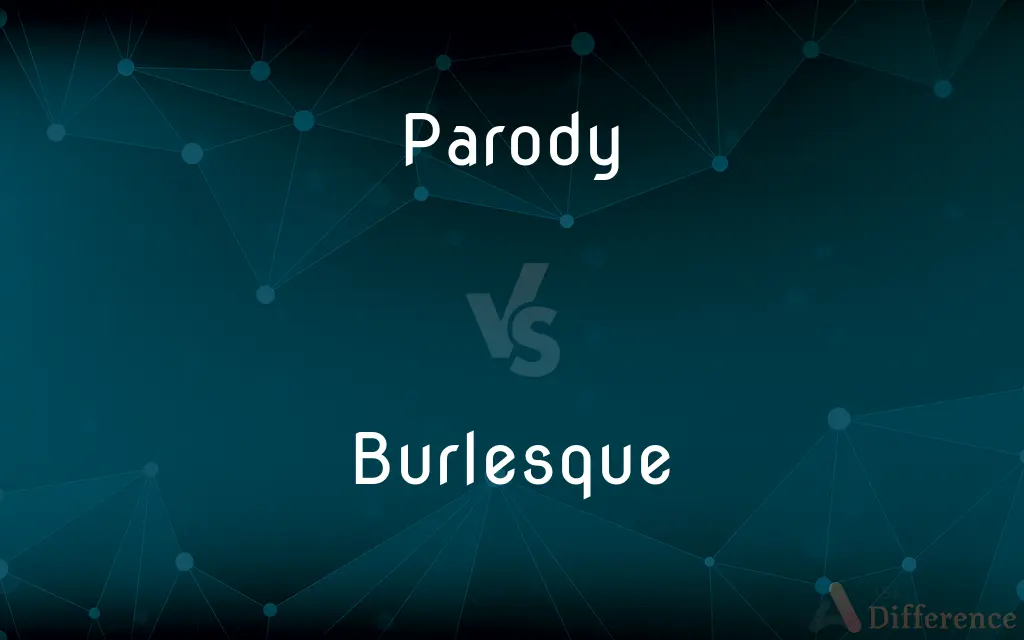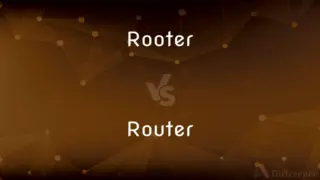Parody vs. Burlesque — What's the Difference?
Edited by Tayyaba Rehman — By Urooj Arif — Updated on April 15, 2024
Parody involves humorous imitation of a specific work to exaggerate its features, while burlesque broadly mocks through extravagant comedy and theatrical exaggeration.

Difference Between Parody and Burlesque
Table of Contents
ADVERTISEMENT
Key Differences
Parody focuses on imitating a specific work, such as a film, song, or piece of literature, aiming to create a humorous or satirical effect by exaggerating its distinctive features. In contrast, burlesque is a broader form of satire that includes exaggerated performances, often in a theatrical setting, targeting various subjects or societal norms.
Parodies often zero in on the quirks and flaws of their targets to make a humorous point, while burlesques use a wider array of comedic tools such as slapstick, absurdity, and extravagant costumes to entertain and critique.
A parody typically maintains the structure of the original work but tweaks the content to highlight absurdities or incongruities. On the other hand, a burlesque might not strictly adhere to the original form of any single work but instead uses a variety of sources to create a broadly appealing comedic performance.
While parody primarily serves as a tool for entertainment and social commentary through mimicry, burlesque can also include elements of striptease or musical performances, adding layers of entertainment beyond just satire.
Both parody and burlesque engage audiences by transforming familiar elements into new, humorous contexts. However, parody is generally more focused on mocking specific works, whereas burlesque aims for a bolder, often more risqué form of humor that challenges conventional boundaries.
ADVERTISEMENT
Comparison Chart
Focus
Specific works
Broad societal norms or various artistic forms
Main Elements
Mimicry and exaggeration
Comedy, exaggeration, sometimes striptease
Purpose
Humor through imitation and satire
Entertainment through broad satire and comedy
Typical Format
Films, songs, literature
Theatrical shows, performances
Style
Subtle and focused on specific elements
Bold and often risqué
Compare with Definitions
Parody
Imitation of a particular writer, artist, or genre, exaggerating it deliberately to produce a comic effect:
The film is a parody of the horror movie genre.
Burlesque
Uses bold expressions of humor and exaggeration:
Her burlesque act was known for its bold humor and satirical edge.
Parody
Mimic the style of a particular artist or genre for comic effect:
The sketch parodied famous political debates.
Burlesque
A humorous and provocative stage show featuring slapstick humor, comic skits, and sometimes striptease performances:
The burlesque performance included elaborate costumes and hilarious antics.
Parody
A humorous or satirical imitation of a serious piece of literature or writing:
His parody of Shakespearean drama had the audience in stitches.
Burlesque
Involves extravagant musical and dramatic parody:
The burlesque of the opera was both amusing and musically engaging.
Parody
Often uses exaggeration to highlight absurd aspects of the original work:
Her parody exaggerated the character’s quirks to ridiculous levels.
Burlesque
Often targets a wide range of subjects for ridicule:
The show’s burlesque routine mocked everything from politics to pop culture.
Parody
Typically involves mocking or making fun of the original work:
The parody of the pop song critiqued celebrity culture.
Burlesque
A literary, dramatic or musical work intended to cause laughter by caricaturing the manner or spirit of serious works:
The burlesque show at the club featured a variety of comedic skits.
Parody
A parody, also called a spoof, a send-up, a take-off, a lampoon, a play on (something), or a caricature, is a creative work designed to imitate, comment on, and/or make fun of its subject by means of satiric or ironic imitation. Often its subject is an original work or some aspect of it — theme/content, author, style, etc.
Burlesque
A burlesque is a literary, dramatic or musical work intended to cause laughter by caricaturing the manner or spirit of serious works, or by ludicrous treatment of their subjects. The word derives from the Italian burlesco, which, in turn, is derived from the Italian burla – a joke, ridicule or mockery.Burlesque overlaps in meaning with caricature, parody and travesty, and, in its theatrical sense, with extravaganza, as presented during the Victorian era.
Parody
A literary or artistic work that uses imitation, as of the characteristic style of an author or a work, for comic effect or ridicule.
Burlesque
A literary or dramatic work that makes fun of something, often by means of outlandish exaggeration.
Parody
A genre, as in literature, comprising such works.
Burlesque
A ludicrous or mocking imitation; a travesty
The antics of the defense attorneys turned the trial into a burlesque of justice.
Parody
Something so bad as to be equivalent to intentional mockery; a travesty
The trial was a parody of justice.
Burlesque
A variety show characterized by broad ribald comedy, dancing, and striptease.
Parody
(Music) The practice of reworking an already established composition, especially the incorporation into the Mass of material borrowed from other works, such as motets or madrigals.
Burlesque
To imitate mockingly or humorously
"always bringing junk ... home, as if he were burlesquing his role as provider" (John Updike).
Parody
To make a parody of.
Burlesque
To use the methods or techniques of burlesque.
Parody
A work or performance that imitates another work or performance with ridicule or irony.
Burlesque
(dated) Parodical; parodic
Parody
A popular maxim, adage, or proverb.
Burlesque
A derisive art form that mocks by imitation; a parody.
Parody
To make a parody of something.
The comedy movie parodied the entire Western genre.
Burlesque
A ludicrous imitation; a caricature; a travesty; a gross perversion.
Parody
A writing in which the language or sentiment of an author is mimicked; especially, a kind of literary pleasantry, in which what is written on one subject is altered, and applied to another by way of burlesque; travesty.
The lively parody which he wrote . . . on Dryden's "Hind and Panther" was received with great applause.
Burlesque
To make a burlesque parody of.
Parody
A popular maxim, adage, or proverb.
Burlesque
To ridicule, or to make ludicrous by grotesque representation in action or in language.
Parody
To write a parody upon; to burlesque.
I have translated, or rather parodied, a poem of Horace.
Burlesque
Tending to excite laughter or contempt by extravagant images, or by a contrast between the subject and the manner of treating it, as when a trifling subject is treated with mock gravity; jocular; ironical.
It is a dispute among the critics, whether burlesque poetry runs best in heroic verse, like that of the Dispensary, or in doggerel, like that of Hudibras.
Parody
A composition that imitates somebody's style in a humorous way
Burlesque
Ludicrous representation; exaggerated parody; grotesque satire.
Burlesque is therefore of two kinds; the first represents mean persons in the accouterments of heroes, the other describes great persons acting and speaking like the basest among the people.
Parody
Humorous or satirical mimicry
Burlesque
An ironical or satirical composition intended to excite laughter, or to ridicule anything.
The dull burlesque appeared with impudence,And pleased by novelty in spite of sense.
Parody
Make a spoof of or make fun of
Burlesque
A ludicrous imitation; a caricature; a travesty; a gross perversion.
Who is it that admires, and from the heart is attached to, national representative assemblies, but must turn with horror and disgust from such a profane burlesque and abominable perversion of that sacred institute?
Parody
Make a parody of;
The students spoofed the teachers
Burlesque
To ridicule, or to make ludicrous by grotesque representation in action or in language.
They burlesqued the prophet Jeremiah's words, and turned the expression he used into ridicule.
Burlesque
To employ burlesque.
Burlesque
A theatrical entertainment of broad and earthy humor; consists of comic skits and short turns (and sometimes striptease)
Burlesque
A composition that imitates somebody's style in a humorous way
Burlesque
Make a parody of;
The students spoofed the teachers
Burlesque
Relating to or characteristic of a burlesque;
Burlesque theater
Common Curiosities
What is a parody?
A parody is a humorous or satirical imitation of a serious piece, aimed at mocking or making fun of its style or subject.
How does parody differ from satire?
Parody specifically targets and mimics the style of particular works for comic effect, whereas satire is broader, critiquing social norms and behaviors.
How has burlesque evolved over time?
Historically starting as a theatrical parody, modern burlesque has evolved to include elements of variety shows, cabaret, and even circus performances.
What should someone expect when attending a burlesque performance?
Attendees should expect a lively, often provocative show that combines humor, dance, and theatrical antics, designed to entertain and occasionally challenge societal norms.
Can burlesque be considered offensive?
Depending on its content and the audience’s sensibilities, burlesque can be seen as provocative, but it is generally intended as playful and entertaining satire.
Why do creators use parody?
Creators use parody to critique, comment on, or poke fun at original works, highlighting their absurdities or flaws through humor.
What are common elements in a burlesque show?
Common elements include slapstick comedy, elaborate costumes, musical performances, and sometimes striptease.
What is burlesque?
Burlesque is a form of entertainment that uses comedy, exaggeration, and theatricality, often including risqué elements, to entertain and provoke thought.
Is parody protected by law?
In many jurisdictions, parody is protected under fair use laws, allowing for creative and critical expression without infringing on copyright.
How does the intention behind parody and burlesque differ?
Parody aims to entertain by closely imitating and exaggerating specific works, while burlesque seeks to engage and amuse audiences with a broader approach to satire and performance.
Share Your Discovery

Previous Comparison
Uncover vs. Reveal
Next Comparison
Rooter vs. RouterAuthor Spotlight
Written by
Urooj ArifUrooj is a skilled content writer at Ask Difference, known for her exceptional ability to simplify complex topics into engaging and informative content. With a passion for research and a flair for clear, concise writing, she consistently delivers articles that resonate with our diverse audience.
Edited by
Tayyaba RehmanTayyaba Rehman is a distinguished writer, currently serving as a primary contributor to askdifference.com. As a researcher in semantics and etymology, Tayyaba's passion for the complexity of languages and their distinctions has found a perfect home on the platform. Tayyaba delves into the intricacies of language, distinguishing between commonly confused words and phrases, thereby providing clarity for readers worldwide.














































